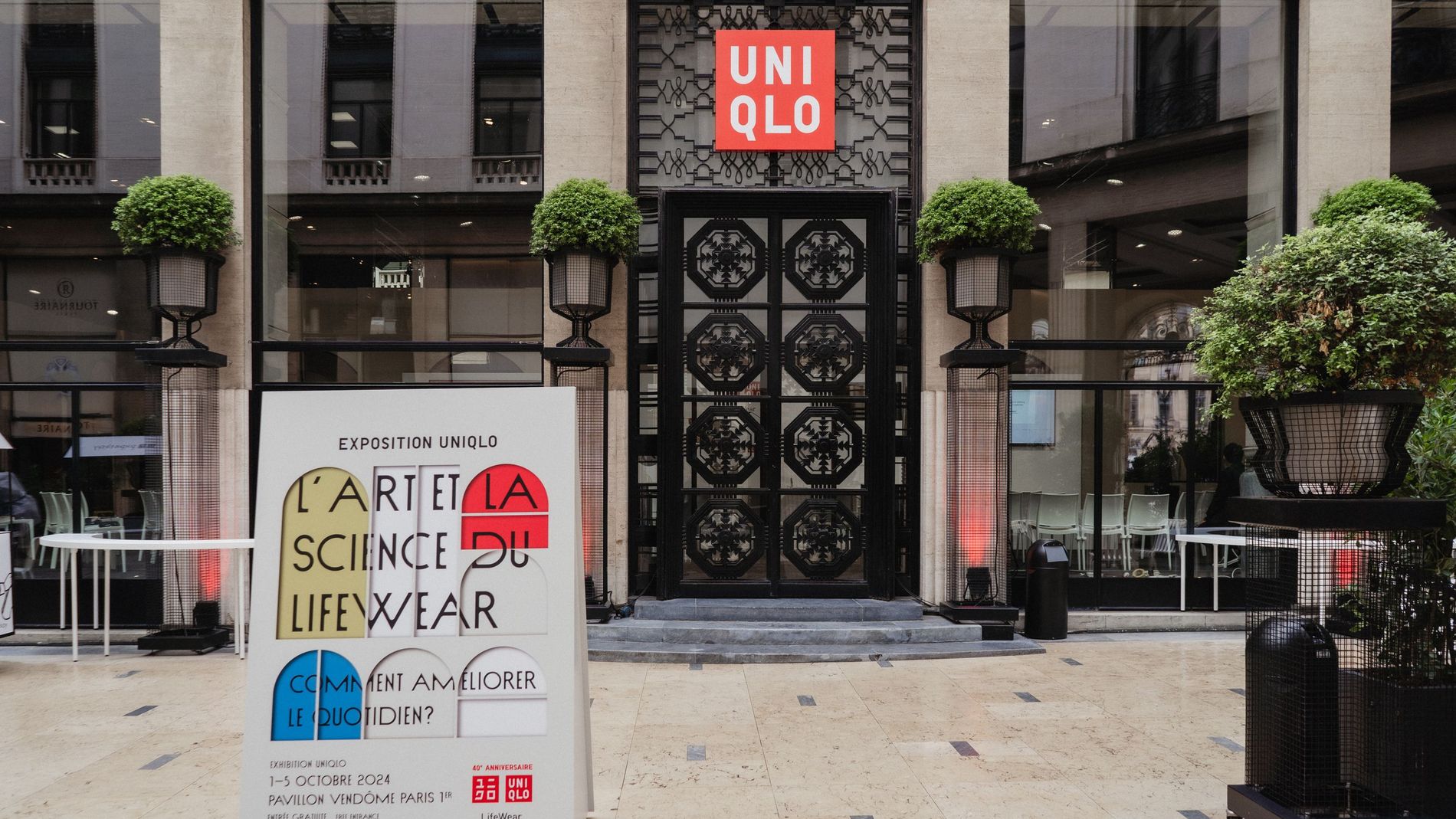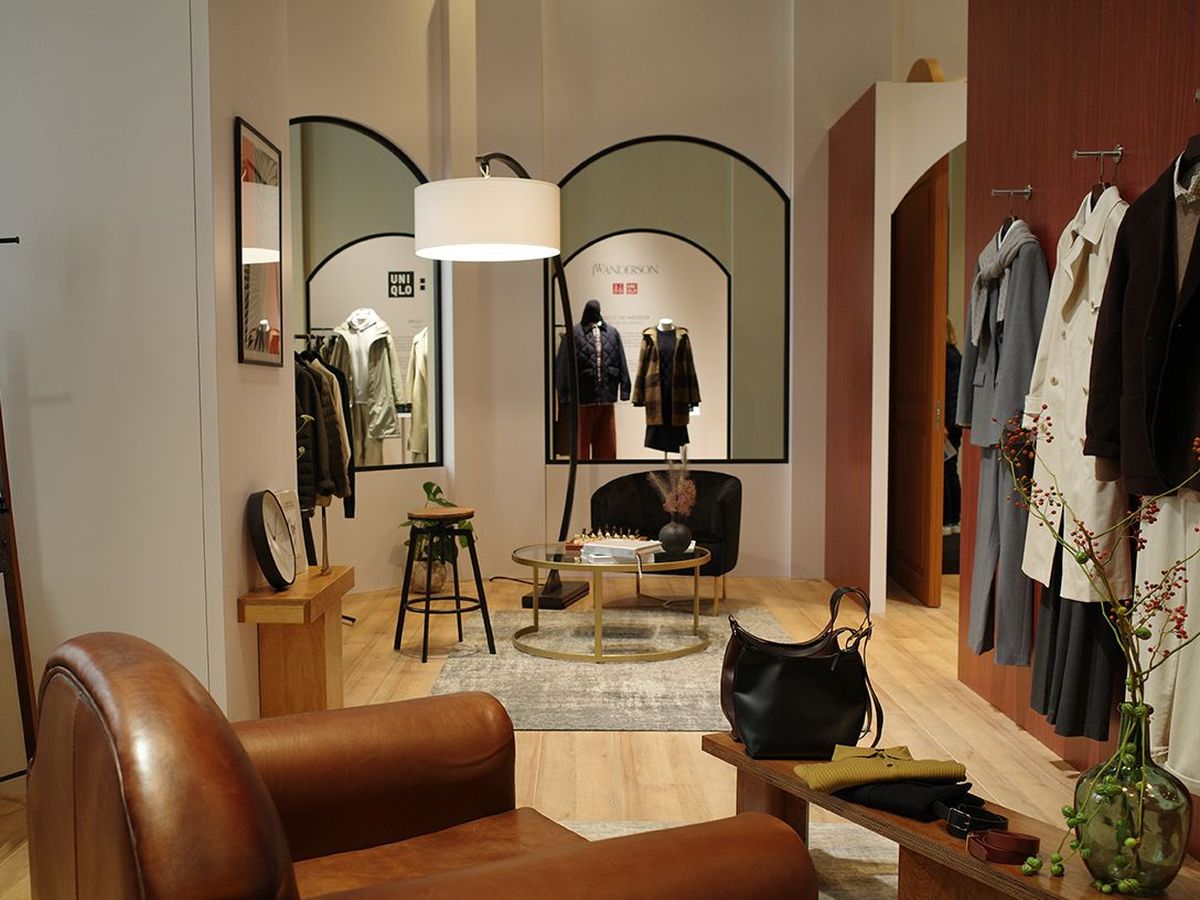For 40 years, Uniqlo has been striving to reinvent not just clothes, but the very idea of clothing. Now, its anniversary campaign bolsters the brand’s democratic approach to apparel by posing the question: 'What makes life better?' Uniqlo ambassador Roger Federer, creative director Clare Waight Keller and the brand's creative powerhouse John C Jay share their thoughts with Vogue Scandinavia
“I think being kind should be normal,” says Roger Federer. It's a comment in character for the notoriously well-mannered 43-year-old Swiss tennis legend, but slightly out of place in the context of a fashion event: Federer is in Paris for Uniqlo's LifeWear Day, which this year, doubles as a celebration of the brand's 40th anniversary. But throughout this particular event, kindness, empathy and humanity are recurring themes.
Federer, who has been a Uniqlo ambassador since 2018, now stars (alongside other brand collaborators) in a new LifeWear campaign that asks ‘What makes life better?' – a simple question that has the power to create change. “I think it’s a question that’s on everyone’s mind right now, no matter who you are, no matter what political stripe you may be, no matter what economic situation you may have,” says John C Jay, the President of Global Creative for Fast Retailing Co (the owner of Uniqlo and several other lifestyle brands). Jay is sitting in the light-filled boardroom of Uniqlo's Opéra headquarters, directly above the store's Parisian flagship. “So, when you ask that question – 'What makes life better?' – it has something to do with humanity," he says.
Jay’s voice is an important one in the conversation at LifeWear Day. His history with the brand traces back to 1998, when – shortly after moving to Tokyo to head up the Asian base for a major American agency – he ventured to Yamaguchi Prefecture in Japan to meet with Uniqlo’s founder Tadashi Yanai. “I went and I just fell in love with them, they were just so unusual,” Jay says, recounting his first impressions of Yanai and the Uniqlo team. “There was a cafeteria where everyone in the company ate and I would go and eat with Mr. Yanai,” Jay recounts. “He would clean the plate himself, taking the dishes to the conveyor belt, and that’s when it clicked with me about democracy. He didn’t just talk about it, he acted on it. He was living proof.”

In line with Uniqlo's 40-year anniversary celebration, a public exhibition was unveiled in Paris entitled The Art and Science of LifeWear: What Makes Life Better? . Photo: Courtesy of Uniqlo
Jay’s first work for Uniqlo was a fleece apparel campaign released in the same year, which sparked a surge in popularity for the brand. “I hope I’m right about this – I believe it helped to change the company,” Jay says of the advertisement. “To this day, I’m still very proud of that work,” he sadds, noting how it was the first time the brand managed to effectively communicate its democratic ethos – and begin building more of a human connection.
Now, Jay has been witness to a large proportion of Uniqlo’s 40-year journey, in which time the brand has grown from its small base in southern Japan to a powerhouse international brand with over 2,000 stores worldwide. As Jay knows well (he wrote the first LifeWear book that defined the philosophy of the range) the continued growth and success of Uniqlo has always come back to the idea of human connection. “The company was intensely Japanese which was its unbelievable strength,” Jay says, “but if you’re trying to grow across the world it can be a hindrance if you don’t have a feel for the pulse.” In his own words, the growth journey taught him – and in turn, Uniqlo – to “be prepared to unlearn in order to learn again.”
It’s the most democratic question of them all, and we’re interested in capturing answers from all around the world. Having a sense of human empathy, connection and understanding is really crucial as we build our brand to the next level.
John C Jay, President of Global Creative for Fast Retailing Co
This willingness to “unlearn to learn” has allowed Uniqlo to remain relevant and successful amongst a huge and diverse customer base within widely varying and constantly evolving cultural settings. Which is where the new campaign, ‘What makes life better?’, comes in. “It’s the most democratic question of them all, and we’re interested in capturing answers from all around the world,” Jay says. “That’s going to help us to be a global brand, to have a deeper sense of empathy for people from societies that differ from the ones we come from,” he goes on. “Having a sense of human empathy, connection and understanding is really crucial as we build our brand to the next level.”
A big part of reaching various global communities is through ambassadors like Federer – known for the social mission of his own Roger Federer Foundation – who can help to create conversations and bring these conversations worldwide “to everyone,” Jay emphasises. “The key is everyone.” Sharing the spotlight with Federer at Uniqlo’s LifeWear Day in Paris is British fashion designer Clare Waight Keller – newly appointed as Creative Director for the brand's mainline following several influential Uniqlo: C collaborative collections. Waight Keller is another natural fit for Uniqlo, who cites ‘creation and connection’ as the answer to what makes life better. “It’s a very interesting topic because it involves all of us, we’re all searching for the answers to what life is, and what makes it better," the creative director says. “Because I’m on the creative side of the industry, for me, it’s about curiosity and really being inspired.”

Inside Uniqlo's The Art and Science of LifeWear: What Makes Life Better? exhibition in Paris's Pavillon Vendôme. . Photo: Courtesy of Uniqlo

Photo: Courtesy of Uniqlo
For Waight Keller, who has lived in multiple cities around the world throughout her illustrious design career, a sense of place is also the key to making life better. “Just really whenever you’re somewhere, to experience that sense of place,” she explains. “I love living in other cultures. It opens your eyes to the way other people live their lives. You learn something from wherever you go.”
Federer echoes the sentiment. “I travelled from January to November every year for so many years, and now, it’s such a pleasure to do that with Uniqlo and to the trips that we do – diving deeper into society,” Federer says. “That’s what I’m actually looking forward to in my post-career life. Not just travelling between hotels and clubs - tennis clubs, this is, not nightclubs,” he clarifies, laughing. “I’m looking forward to diving deeper into the culture of each city and country.”
"We’re all searching for the answers to what life is, and what makes it better."
Clare Waight Keller, Creative Director at Uniqlo
This sense of global, human-oriented curiosity is key to Uniqlo's ethos – and the new campaign – and is why the brand believes its physical stores to be so pivotal. “They are the most important part of our existence," says Jay of their network of global stores, "because real human beings come in every day and that's our connection, our emotional connection," he says.
The Nordics are a target for the store space, with a new Danish storefront opening in just a few weeks' time at the prime location of Fisketorvet Copenhagen Mall. "We also just launched a campaign about opening in Texas, USA," Jay notes. "It’s a very different culture to NYC or LA, so the challenge is if you’re sitting in Japan, do you know how it’s different? Or more importantly, do you know why it’s different?"

Photo: Courtesy of Uniqlo
When celebrating a 40th-anniversary milestone, it's only natural to look ahead and envision what the next 40 years could hold. "A combination of store and vision has to be the future," Jay says, adding the importance of a foundation of consumer trust – established through Uniqlo's consistent delivery of high-quality products.
As proven by the voices of Federer, Waight Keller and fellow Uniqlo collaborator Jonathan Anderson in the 'What makes life better?' campaign, everyone has their own personal response to the democratic question. And rather than enforcing LifeWear as the answer, it's Uniqlo's act of asking the question that empowers LifeWear. "You truly become a global brand when you have a sense of empathy and understanding, when you have an emotional connection with the community that you’re doing business with and the country you’re doing business with," Jay comments.
Watch the 'What makes life better' campaign video, featuring Federer, Waight Keller, and Anderson below, to dive further into the ever-evolving question that underpins Uniqlo's ever-evolving philosophy of LifeWear.